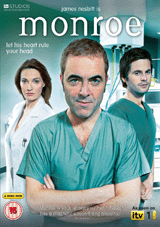 Doctor Gabriel Monroe (James Nesbitt), the titular and principal character in Peter Bowker’s entertaining ITV1 drama series, is a neurosurgeon at St Matthew’s Hospital in Leeds. His wit is as incisive as his scalpel and his private life is as messily traumatic as the injuries of the people upon whom he operates.
Doctor Gabriel Monroe (James Nesbitt), the titular and principal character in Peter Bowker’s entertaining ITV1 drama series, is a neurosurgeon at St Matthew’s Hospital in Leeds. His wit is as incisive as his scalpel and his private life is as messily traumatic as the injuries of the people upon whom he operates.
Monroe is obsessed with gambling; his relationship with his son Nick (Perry Millward) involves regularly emptying a box of eggshells onto the carpet and trying to tiptoe around them, while his marriage to Anna (Susan Lynch) is all-but-over in episode one and goes downhill from there. Yet despite his failures outside the hospital, once he dons the surgical greens Monroe is a genius: a brilliant neurosurgeon and a fiercely compassionate human being. All the flaws which count against him in his personal life work in his favour dealing with his patients and their relatives.
He does as much good speaking to panicking parents on the smoking terrace as he does when saving lives on the operating table – and he still finds time to play cards with friendly neighbourhood anaesthetist Lawrence Shepherd (Tom Riley) and poke fun at cardiac surgeon Jenny Bremner (Sarah Parish), a consummate professional with a sense of humour that is dry going on arid and someone upon whom Monroe’s charms have no effect whatsoever.
However, the show isn’t all dark, snark and chain-smoking brain-surgeons. Monroe is as much about the humanity and morality of its characters and subject as anything else, and perhaps the finest moments in the series have been its most subdued: the understated, reflective instances in the aftermath of operations, successful or otherwise, have been easily as effective as any of the buckets of gore that could have been slathered all over this series. Yes, there are a number of shots of opened-skulls and pink, pulsating parts of the body that are usually buried in the darkness beneath the skin are brought to the light from time to time, but the judicious restraint shown by the directors in not lingering too long on the exposed brains and bloody wounds is commendable. This is a character drama more than anything else; the doctors and patients are more important than the prognoses and treatment.
The series is a long way from perfect, however. It sags in the middle with the weight of an identity crisis, like a kitchen ceiling underneath a leaking sink in the bathroom – it’s difficult at times to tell whether it wants to be House, Cracker or Casualty or some superior fusion of all three – but it resolves its differences with itself and the final episode is the finest of the six. The sequence in which a father, numbed with grief, asks Monroe of his fatally injured daughter, ‘How can she be dead when there are so many bad buggers still alive?’ is a deliberately downplayed emotional highlight; as is the scene when Monroe and his wife discuss the death of their own daughter. It’s been a long time since a British medical drama managed to be this moving without sinking into schmaltz, and that’s where Monroe, despite its flaws, scores most highly. It’s a qualified success, perhaps, but a success all the same.
![]()
Extras: This 2-disc set has a disappointing paucity of bonus material, with just two behind-the-scenes featurettes; one looking at concept and filming, the other concentrating on the design and construction of the sets. The first is entertaining enough, with writer and executive producer Peter Bowker discussing his creation of Gabriel Monroe (‘I wanted somebody who had an energy and an attraction, and was kind of offensive and tactless, but clearly on the side of the angels’) and James Nesbitt explaining his portrayal of someone ‘flawed, but touched with genius’. However, the second piece, despite its demonstration of the time and effort spent converting a disused girls’ school into what looks like a fully-functioning hospital, will only be of interest to those curious about the mechanics of television production.
Sadly, that’s it. There are no deleted scenes, no outtakes, no features looking at the music – both the incidental compositions of Dominik Scherrer and the selection of pre-recorded material have been a major part of the series – and, perhaps worst of all, no commentaries. Peter Bowker and James Nesbitt make entertaining interviewees; their remarks and reminisces about filming Monroe would have been very welcome.
![]()
Released on DVD on Monday 25th April 2011 by ITV Studios Home Entertainment.
Watch the trailer…

